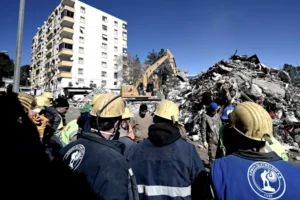
Just two days after announcing a $400 million plea for Syrians, the UN has launched a more than $1 billion funding request for the Turkish earthquake relief mission.
The people have “experienced unspeakable heartache,” according to UN aid chief Martin Griffiths, who visited Turkey last week. He continued: “We must stand with them in their darkest hour and ensure they receive the support they need.”
At least 36,187 people have died as a result of the earthquake that struck southern Turkey on February 6; meanwhile, 5,800 people have been confirmed dead in neighboring Syria.
Rescue operations have resumed in Turkey, but the number of persons being saved every day has drastically decreased.
Amid the province of Kahramanmaras, a young girl was discovered alive in the wreckage on Thursday, more than ten days after a severe earthquake struck the area. But these kinds of rescues are getting harder to come by.
248 hours after the 7.8 magnitude earthquake occurred in the middle of the night on February 6th, broadcaster TRT Haber reported that the 17-year-old was successfully rescued from the rubble of a fallen apartment building.
Growing resentment toward what they perceive as dishonest building techniques and seriously defective urban planning, which led to thousands of homes and businesses collapsing, is felt by families who are still trying to find their missing relatives.
Turkey has ordered the imprisonment of more than 100 people, including developers, and committed to look into anyone suspected of being responsible for the collapse of structures.
The earthquake struck a region of Syria that had been divided and decimated by a 12-year civil war.
The Syrian government reported 1,414 fatalities in areas under its control. In the rebel-held northwest, more than 4,000 people have died, but rescuers claim no one has been recovered alive there since February 9.
Because supplies nearly always go to other areas of the vast disaster zone, the humanitarian effort has been hindered by the violence, and many people in the northwest feel abandoned.
In the early aftermath of the earthquake, deliveries from Turkey were completely stopped when a route utilized by the United Nations was momentarily blocked. Days after the catastrophe, Syrian President Bashar al-Assad authorized the opening of two more crossings earlier this week.
According to a representative for the UN Office for the Coordination of Humanitarian Affairs, 119 UN vehicles had passed through the Bab al-Hawa and Bab al-Salam border crossings between Turkey and Syria since the earthquake as of Thursday.
The town of Afrin, which is held by rebels in Syria, has received a convoy of 15 relief trucks from Qatar carrying tents, food, and other necessities.
The International Federation of Red Cross and Red Crescent Societies secretary-general, Jagan Chapagain, predicted that the crisis would last for a long time and declared that his group would increase its relief request for both countries by more than three times.
On his journey from Syria to Turkey, he declared in Beirut that “its impact on people would not be over in three months, so we are taking a 24-month perspective.”
According to a report released on Thursday by the European Bank for Reconstruction and Development (EBRD), the potential economic impact of the earthquake in Turkey could result in a reduction of up to one percent of the nation’s gross domestic product this year.




